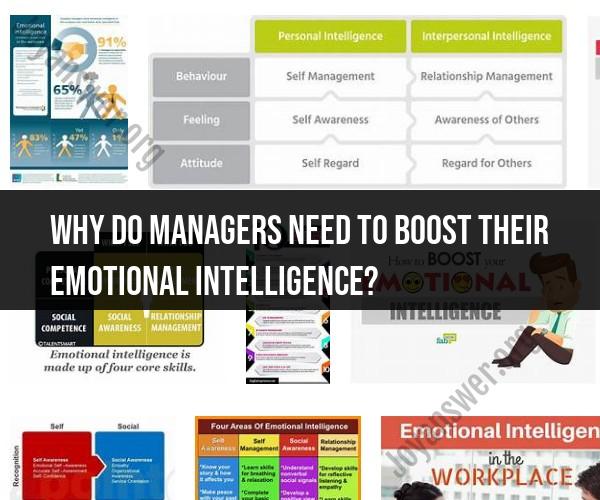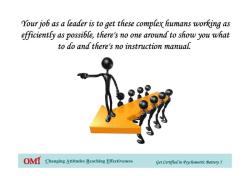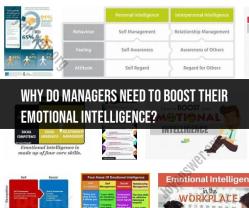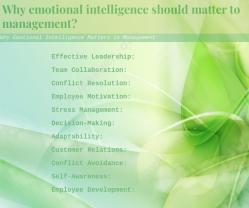Why do managers need to boost their emotional intelligence?
Managers need to boost their emotional intelligence (EI) for several compelling reasons:
Effective Leadership: Emotional intelligence is closely tied to effective leadership. Managers with high EI are better equipped to understand and manage their own emotions, which, in turn, enables them to relate to and connect with their team members on a deeper level. This fosters trust, collaboration, and loyalty among employees.
Improved Communication: EI enhances interpersonal communication skills. Managers with high EI can listen actively, empathize with their employees, and convey messages in a way that is clear and respectful. This leads to better relationships and minimizes misunderstandings.
Conflict Resolution: Conflicts are inevitable in any workplace. Managers with high EI can navigate conflicts more effectively by staying calm, understanding the perspectives of all parties, and finding constructive solutions. This reduces workplace tension and disruption.
Better Decision-Making: EI plays a role in decision-making. Managers who are in touch with their emotions can make decisions that take into account the emotional impact on employees and stakeholders. This leads to more thoughtful and ethical choices.
Employee Motivation: Managers with high EI can motivate and inspire their team members. They recognize the importance of recognizing individual achievements, providing constructive feedback, and fostering a positive work environment, all of which boost employee morale and productivity.
Stress Management: The role of a manager can be stressful, with various responsibilities and challenges. High EI helps managers manage their own stress and support their team in dealing with stress, promoting overall well-being.
Adaptability: The business world is constantly changing. Managers need to adapt to new challenges, technologies, and ways of working. High EI helps them embrace change, guide their teams through transitions, and reduce resistance to change.
Ethical Leadership: EI contributes to ethical leadership. Managers with high EI are more likely to exhibit ethical behavior, transparency, and accountability in their actions, setting a positive example for their teams.
Crisis Management: During times of crisis or uncertainty, managers with high EI can provide stability and support. Their ability to remain calm and empathetic is particularly valuable during challenging periods.
Enhanced Team Dynamics: EI positively impacts team dynamics. Managers with high EI can build cohesive and collaborative teams, fostering a sense of belonging and camaraderie among team members.
Customer Relations: In customer-facing roles, EI is essential for understanding and addressing customer needs, complaints, and emotions effectively, leading to improved customer satisfaction and loyalty.
Personal Growth: Developing EI is a journey of personal growth and self-awareness. Managers who invest in enhancing their EI not only become better leaders but also experience personal development and increased self-awareness.
In summary, emotional intelligence is a critical component of effective managerial success. It promotes better communication, decision-making, conflict resolution, and employee motivation. Managers who prioritize and develop their emotional intelligence can create a more positive and productive work environment for themselves and their teams, ultimately contributing to organizational success.







